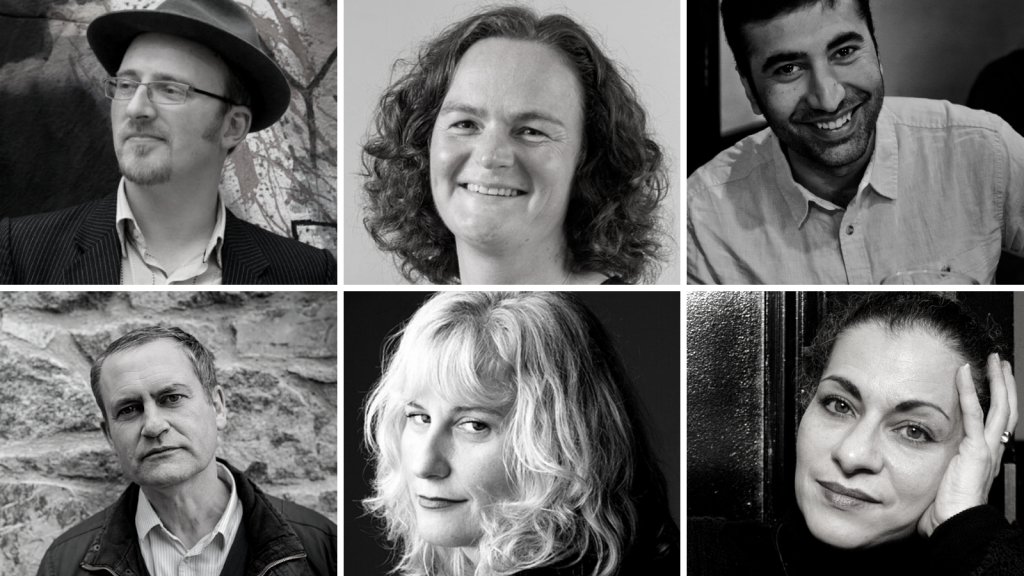
The Poets
Aneirin Karadog won the Chair in the National Eisteddfod in Monmouthshire and District National Eisteddfod in 2016 with a sequence of poems on the theme ‘Boundaries’. He is a member of Y Deheubarth team in the annual Ymryson and has won several awards for his strict meter poetry: the Emyr Feddyg Scholarship at the National Eisteddfod in Newport, the Urdd Chair in 2005 and the Wales Book of the Year poetry category in 2013 with his first volume of poetry O Annwn i Geltia (Cyhoeddiadau Barddas) and again with his second book Bylchau (Barddas Publications, 2016). He co-presents and co-produces a Welsh poetry podcast with Eurig Salisbury called Clera, with new chapters monthly since October 2016. In 2019 he published another book of poems, Llafargan (Barddas Publications). Aneirin was Bardd Plant Cymru 2013-2015.
Originally from Germany, Dani came to Wales in 2015 to live here and learn Cymraeg (the Welsh language). She now lives in Bethesda, Gwynedd and works for Mentrau Iaith Cymru, the Welsh language initiatives, coordinating projects all over Wales. She’s a member of the Menter Iaith in Bangor and Llety Arall, a community company in Caernarfon. She organises events in Cymraeg for people to practice and enjoy the language.
Dani’s poetic work mainly includes a poem that won the first prize in the Learners Eisteddfod in 2017 and various translations of Ifor ap Glyn’s poems into German.
Hammad Rind was born in Punjab, Pakistan, and currently lives in Cardiff. His first novel, Four Dervishes, a social satire based on a dastan by Persian poet, Amir Khosrow, with elements of magic realism, is due to be published by Seren Books in the summer 2021. He has led a number of writing workshops before including one on ghazal for Seren Poetry Festival and another on storytelling for children in Cardiff. His work has appeared in a number of publications including The Madras Courier, James Joyce Broadsheet, Y Stamp and Porridge Magazine. Hammad can speak nine languages, and incorporates elements of these different languages into his work.
National Poet of Wales Ifor ap Glyn was born and bred in London to Welsh parents. He is a multi-award-winning poet, presenter, director and producer. National Poet of Wales (2016 – 2022) and Bardd Plant Cymru (2008 – 2009), Ifor is a prolific writer who has twice won the Crown at the National Eisteddfod – one of the festival’s most prestigious prizes. Ifor has represented Welsh poetry around the world in both the Welsh and English language, most recently in Cameroon, Lithuania, China, Belgium, Germany, and Ireland.
Ifor lives in Caernarfon, he was one of the founders of Cwmni Da – an independent television and film production company. He has won several BAFTA Cymru awards for his work including the series Lleisiau’r Rhyfel Mawr and Popeth yn Gymraeg.
Meltem Arikan is a Turkish-Welsh author. Arikan is known for her sharp critique of society and fearless and outspoken voice in her novels, plays, poems and articles.
Arikan has written 11 books, including nine novels and five plays. Her fourth novel Yeter Tenimi Acıtmayın (Stop Hurting My Flesh), was banned in early 2004 by the Committee to Protect Minors from Obscene Publications. The ban was lifted after the fight, and Arıkan was awarded the “Freedom of Thought and Speech Award 2004” by the Turkish Publishers Association. She has received several awards and was short-listed for the Freedom of Expression Award in 2014 by Index on Censorship for her play ‘Mi Minor’, which the Turkish authorities claimed was a rehearsal for the Gezi Park demonstrations in 2013. Their subsequent hate campaign, fuelled by state-sponsored media, forced her to leave Turkey to start living in Wales. In 2019 Turkish court accepted Gezi’s Indictment seeking life sentences for 16 people, including her.
Shara Atashi is a translator and writer based in Aberystwyth. She translates from Persian and German and writes creative non-fiction, fiction and poetry in English. She was involved in literary life from early childhood as her father, the late Iranian poet Manouchehr Atashi, was a professor of literature and editor of Iran’s national broadcasting magazine. Shara left Iran with her mother after the 1978 revolution at the age of twelve and lived and studied law and English in Germany. After years of legal work in Berlin and the Hague she relocated to the UK where she joined the Peterborough Writers’ Circle under the guidance of Tim Wilson and began to actively share her writing through local publications and in an anthology. Shara is currently working on a bilingual poetry book, a joint project in which she translates some of her father’s works into English and the poet Mary Burdett-Jones translates them from English into Welsh. The book, Tomb at Bushehr, includes her memoir about her relation to Persian poetry and is due for publication this year.